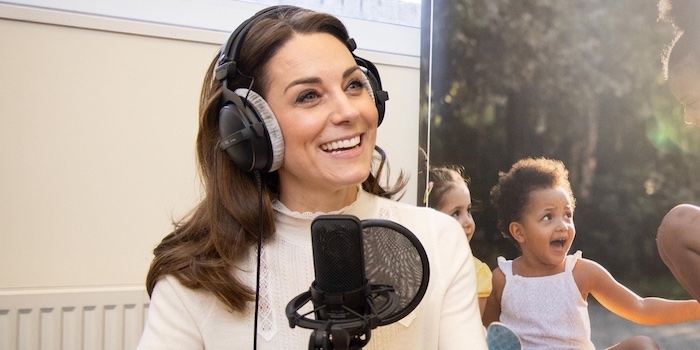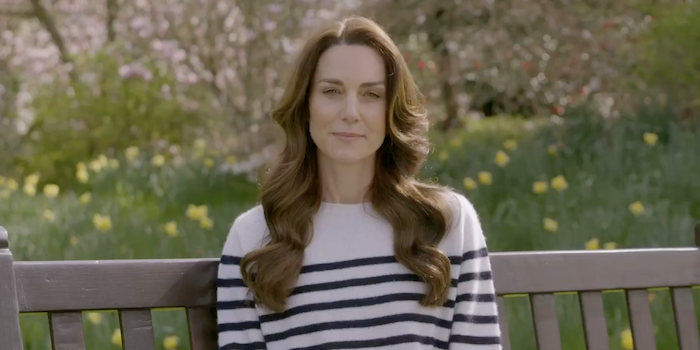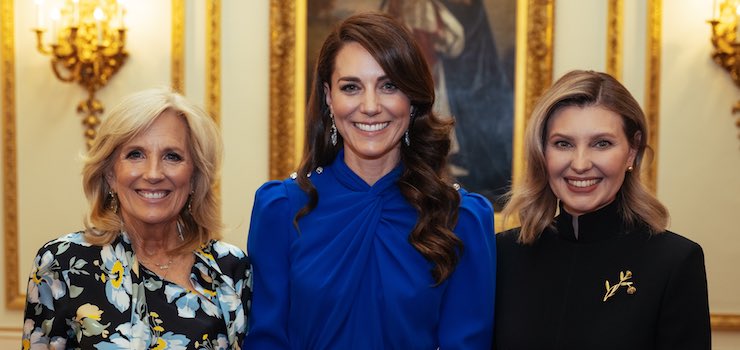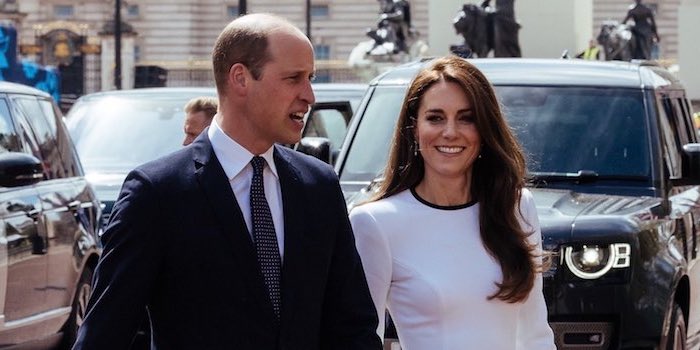The Duchess of Cambridge has given a podcast interview to discuss the early years as part of her campaign for her 5 Big Questions quiz. Kate spoke with Giovanna Fletcher for the Happy Mum, Happy Baby podcast.
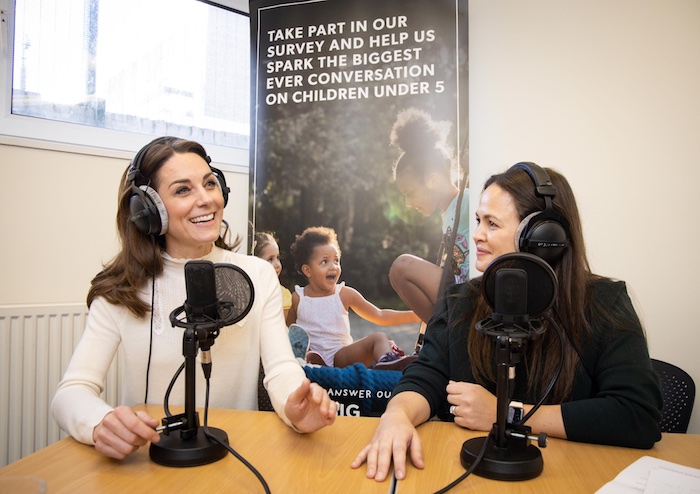
You can listen to the full podcast interview here. I’m only quoting parts of Kate’s answers because I got about 4 minutes into transcribing it, gave up, and went searching for other transcriptions because it’s so long. FYI, ellipses (…) means the host was speaking and I cut those parts out.
On working in the early years for a long time:
Yes, it has been quite a journey, and I’m excited now to be talking about this a bit more publicly, but since I got married, I’ve been really looking into this as a huge passion. And going out and listening to what makes people tick, and actually things that unify people, but also the struggles that people are facing. Right in the early days, meeting lots of people who are struggling with addiction, homelessness, abuse and things like that, you really get moved by some of the challenges that people are facing, and it’s really heartbreaking to hear. And the more you look into everybody’s experiences, so much of those, the hardest social challenges, really get traced right back to the earliest years of somebody’s life. And you hear that time and time again across the nation, across the world, you hear the really sad reality that actually what we experience in our childhood really has a lifelong impact on our future health and happiness. So I suppose that has really driven my interest in really digging deep into the early years landscape; speaking to academics, speaking to doctors, practitioners, charities, and all those, really, within the sector to try and work out what could be done to help prevent some of these really sad social challenges that, I think, all of us witness across the country.
On talking to parents, and the survey:
Well I think, you know, ultimately if you look at who’s caring and looking after and nurturing children in this most vital period, from pregnancy all the way to the age of five, you know parents and carers are right at the heart of that, and families are right at the heart of that, and although I’ve spoken to the scientists and the service providers and things like that, it’s so important to listen to families. What is it that they aspire to? What is it that they want? What are their challenges? And that’s what we’re doing here with the survey is asking people what is it that matters for them in raising their children today.
Did Kate care about this subject before becoming a mom:
Yes, it was. Because lots of people say, ‘I know why you’re doing your work, because you’re a mum now, and it’s obviously an interest’. Yes, there is that personal element. I’ve learnt a huge amount, there’s stuff I would have done so differently, you know, right at the beginning considering what I’ve learnt now. But yes I think it was really shocking actually to see how challenges that we see in society, how so much of that is connected through poor mental health and then looking back on to actually often traumatic experiences in early childhood. And that, I think, felt such an important period to really look into pre-having children. I suppose it’s only emphasized it more now being a parent myself, knowing some of the challenges and some of the pressures, also the things that might be stopping or being a hindrance to those either reaching out for help or really providing the best support and care for the children in their care.
What was Kate’s childhood like:
I had a very happy childhood. It was great fun. I’m very lucky to come from a very strong family. My parents were hugely dedicated to us, my siblings. I really appreciate, now as a parent, how much they sacrificed for us. … But it is really true, they would come to every sports match, they’d be the ones on the sidelines shouting. And we’d always have our family holidays together. But I think the things that really resonate with me most is the simple things, and I think, I see that even now with my own children is life now is so busy, so distracting, and actually sometimes the simple things like watching a fire on a really rainy day provides such enjoyment and I remember that from my childhood, doing the simple things, going for a walk together, and that’s really what I try and do with my children as well, because it totally stripes away all the complications, all the pressures as a parent. And I think those experiences as well mean so much to children, and the world that they’re in, which is a real adventure for them at that age.
On mom guilt:
Yes, absolutely. I think anyone who doesn’t as a mother is actually lying. Yep; all the time, yeah. And, you know, even this morning, coming to the nursery visit here, George and Charlotte were like ‘Mummy how could you possibly not be dropping us off at school this morning?’ But no it’s a constant challenge. You hear it time and time again from mums, even mums who aren’t necessarily working and aren’t pulled in the directions of having to juggle work life and family life, they don’t feel they’ve got… Exactly, and actually always sort of questioning your own decisions and your own judgements and things like that, and I think that starts from the moment you have a baby. … But also I feel huge responsibility because what I’ve learnt over the last few years is so fascinating and I definitely would have done things differently, even during my pregnancy, than I would have done now, knowing the importance of the early years. … Even in pregnancy, because you know there is such, the science, and I found that fascinating to see the wellbeing of the mother – not just physically – you know there’s so much information about making sure you exercise and making sure you have a healthy diet and things like that, which yes is definitely important, but the emotional wellbeing of the mother directly impacts the baby that’s in, that you’re growing.
On pregnancy with George:
It was fine; I got very bad morning sickness. So I’m not the happiest of pregnant people. … Lots of people have it far, far worse. But it was definitely a challenge. Not just for me, but also for your loved ones around you and I think that’s the thing – being pregnant and having a newborn baby and things like that, impacts everybody in the family. William didn’t feel he could do much to help and it’s hard for everyone to see you suffering without actually being able to do anything about it. … Yes, utterly rotten. I was really sick. I wasn’t eating the things I should be eating, but yet the body was still able to take all the goodness from my body and to grow new life, which I think is fascinating.
On hypnobirthing and labor:
Yes, I did. Well actually it was through hyperemesis that I really realized the power of the mind over the body because I really had to try everything and everything to try and help me through it. … There’s levels of it. I’m not going to say that William was standing there chanting sweet nothings at me. He definitely wasn’t. I didn’t even ask him about it, but it was just something I wanted to do for myself. I saw the power of it, really, the meditation and the deep breathing and things like that that they teach you in hypnobirthing when I was really sick and actually I realized that this was something that I could take control of, I suppose, during labour. It was hugely powerful. And actually, because it had been so bad during pregnancy, I actually really quite liked labor… Because it was something that actually, it was an event that I knew there was going to be an ending to. But I know some people have really, really difficult times; it’s not for everybody. … No pregnancy is the same, no birth’s the same.
On presenting the babies to the world outside Lindo Wing:
Yeah, slightly terrifying, slightly terrifying, I’m not going to lie. … No, it’s hard, like decompartmentalize, what’s the word? Compartmentalize. Yes, um, the whole thing. You know, everyone had been so supportive and both William and I were really conscious that this was something that everyone was excited about and we’re hugely grateful for the support that the public had shown us, and for us to be able to share that joy and appreciation with the public, I felt was really important. But equally it was coupled with a newborn baby, and inexperienced parents, and the uncertainty of what that held, so there were all sorts of mixed emotions.
How many hours after birth did they come out of the hospital?
I, oh my gosh, I can’t remember. Everything goes in a bit of a blur. I think I stayed, yeah I did stay in hospital overnight. I remember it was one of the hottest days and nights with huge thunderstorms so I didn’t get a huge amount of sleep, but George did which was really great. But I was keen to get home because, for me, being in hospital, I had all the memories of being in hospital because of being sick so it wasn’t a place I wanted to hang around in. So, I was really desperate to get home and get back to normality. But I think you think, particularly with your firstborn baby, you think everything is going to go back to how it was. I totally underestimated the impact and the change it had on our lives from that moment really and I think, unless you’ve got children, you don’t realize. No amount of planning and preparation can get you ready for that moment.
What part’s of Kate’s childhood does she want to give her children:
I think, if I take the experience of my own childhood, coupled with what I know now, what I’ve learnt from the experts in the early years sector, I think there’s a few things that really stand out for me. One is quality of relationships. So, those moments that you spend with people that are around you. I remember that from my own childhood. I had an amazing Granny who devoted a lot of time for us – playing with us, doing arts and crafts, and going to a greenhouse doing gardening stuff, and cooking with us – and I try and incorporate a lot of the experiences that she gave us at the time into the experiences that I give my children now. But also the environments that you spend time in as well: a happy home, a safe environment. As children, we spent a lot of time outside and it’s something I’m really passionate about. I think it’s so great for physical wellbeing and also mental wellbeing and laying those foundations. But it’s such a great environment to actually spend time building those quality relationships without the distractions of ‘I’ve got to cook’ and ‘I’ve got to do this.’ And actually, it’s so simple. I’ve got this one photo of Charlotte smelling a bluebell and I just, it really, for me, is moments like that mean so much to me as a parent. I try everyday to put moments like that in, even if they’re small, even if I don’t have time, but that in an ideal world is what I’d like to do. Yeah, sort of, great relationships and happy environments and experiences.
On writing a letter to her younger self:
Can I write back to myself? Is that really weird? I think I’d have liked to have written to myself at the beginning of my pregnancy with my first child because I think what I’ve experienced – not only as a mother but also what I’ve learned on my journey through, digging deeper into the early years landscape – I’ve learned a huge amount that I’d really love to go back and tell myself at the beginning of pregnancy, right at the start, what things I feel now really matter in terms of being a parent but also what really matters to the children and my children now. … It’s the simple things that really make a difference. It’s spending quality time with your children. It’s not whether you’ve done every single drop off and every single pick up but actually it’s those quality moments you spend with your child where you’re properly listening to them, properly understanding what they feel, and actually when things are going wrong, actually really taking time to think, ‘How as a mother am I feeling? Am I actually making this situation worse for my child because actually this has brought up all sorts of things that I feel, rather than just focusing on them and how they might be reacting or responding to certain situations?’ That would be another piece of advice I would like to give myself back then. … Someone did ask me the other day, what would you want your children to remember about their childhood? And I thought that was a really good question because actually if you really think about that, is it that I’m sitting down trying to do their maths and spelling homework over the weekend? Or is it the fact that we’ve gone out and lit a bonfire and sat around trying to cook sausages that hasn’t worked because it’s too wet? That’s what I would want them to remember, those moments with me as a mother, but also as a family going to the beach, getting soaking wet, filling our boots full of water, those are what I would want them to remember. Not a stressful household where you’re trying to do everything and not really succeeding at one thing.
On the survey:
Hopefully it’s the first small step into looking at prevention because it’s not just about happy, healthy children, this is actually for lifelong consequences and outcomes. I was looking at one of the stats, I think there’s £17 billion been estimated in England and Wales alone that is spent on late intervention and it’s crazy – because not only because it’s an economic cost but there’s a huge social cost to our communities and our societies. So that’s really why I’m doing this. It’s going to take a long time – I’m talking about a generational change – but hopefully this is the first small step: we can start a conversation around the importance of early childhood development.
Being a mum means:
Compromise.
Since being a mum, I:
I have found a new enjoyment out of life.
I’m happy when:
I’m with my family outside in the countryside and we’re all filthy dirty.
My own transcription, plus pulling some quotes from T&C and Hello
I must preface this next thought with saying I recognize my own overuse of certain words or phrases: I overuse “like”, I overuse “you know”, and probably others I can’t think of at the moment. We all do it. Having said that, Kate actually really sort of needs to, I suppose, rein in her overuse of filler words and phrases. Not only is it awful to listen to someone say “actually” and “really” every other word, it’s atrocious to read. I had to remove a lot of those filler words from these quotes for clarity because she says them so often. Anyway, moving on.
I did listen to the entire podcast, and I encourage you to do so, even if you have it on in the background while doing something else. It’s great to hear from Kate herself on why she cares about this subject, because I know I was questioning it for years when she first got on the children’s mental health train because she would never come out and give a reason why she cared so much. Kate has given so few interviews and speeches over the years, it is nice to hear her speak for an extended period on this subject.
I have to agree with Kate’s opinion that those moments of quality time, when someone is fully engaged with you, are so much more memorable than doing every school run (to use Kate’s example) or cooking every meal or putting your children to bed every night (my friend frets about this one). My mom passed away last year, my grandparents have passed away, and for the life of me I can’t remember those granular activities like the school run or dinner or whatever else. It’s those moments of true quality time like doing a specific activity that I didn’t do with anyone else that I remember the best.
Having said that, I also remember specific moments of trauma or bullying. But the granular, everyday activities I hear parents worry about, are not it. Granted, I’m going off my experiences only, and I don’t have kids, but I like what Kate had to say here (I just wish she’d use less filler words to say it 😉).
In the photo KP released of the podcast interview, Kate is wearing her Sézane jumper she wore to the Stockwell Gardens Nursery on January 29, as this was recorded right after that engagement.

